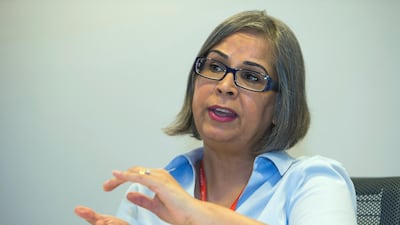Oracle, a computer technology company whose clients include First Abu Dhabi Bank and DP World, projects that nearly half of all data stored in clouds in the Middle East and Africa will run autonomously with the help of artificial intelligence by 2020.
"The current scale of autonomous cloud services is difficult to assess as it is still new in MEA," said Samina Rizwan, senior director of business analytics and big data for the region at Oracle. "[Running autonomously] means the data in the repository will use AI and machine learning to become self-driving, self-repairing and much quicker to respond."
Public cloud spending is expected to cross $1 billion (Dh3.67bn) by the end of the year, while the big data and analytics market is estimated to reach $2.4bn, according to the International Data Corporation. The UAE and Saudi Arabia will lead in this segment, with public cloud spending reaching over $150 million and $138m, respectively by the end of 2018.
Globally, Oracle's revenue from its cloud services and license support increased 8.2 per cent to $6.77 billion in its fourth quarter ending May 31 with more companies adopting cloud computing.
Ms Rizwan said that currently 80 per cent of a company's time is spent on monitoring data and only 20 per cent of time is spent on making decisions.
"An autonomous cloud environment will flip this 20-80 rule on its head," she said.
________________
Read more:
SAP aims to expand Middle East portfolio with UAE data centre
China’s Alibaba posts fastest growth in four years on new businesses
________________
Overall IT spending in MEA will reach over $88bn in 2018, registering a year-on-year growth of 2.7 per cent, according to IDC. The cloud IT Infrastructure revenue grew by 42.3 per cent year-on-year in MEA in the first quarter of 2018.
"Cloud computing is emerging very fast and its adoption rate is tremendous. If you look at a year ago, the portion of overall IT spent allocated to cloud was much lower," said Ms Rizwan.
Autonomous cloud operations will also minimise the scope of cyberattacks, thereby raising security levels.
“The autonomous environment of self-repairing will take away the chance of human error,” said Ms Rizwan. “It will bring down the risks associated with cyber breaches and security ratings will go up. This is very important as per the Gartner study, by 2020, cyber security rating of an enterprise will be equally important as credit rating.”
Globally, Oracle, a data cloud specialist, competes with companies such as SAP and Salesforce. It will soon open its first MEA cloud data centre in Abu Dhabi.
There are other new players emerging in the region.
Alibaba Cloud, the computing unit of Chinese e-commerce group Alibaba, opened its first data centre in Dubai in November 2016 and Amazon Web Services has also signed an agreement with the Bahraini government to open at least three data centres by next year.
Revenue-wise, Oracle's top four industries in MEA are the public sector, telecoms, banking and retail. The UAE, Saudi Arabia and Egypt are its best performing markets.
“The UAE is poised to be one of the leaders in the usage of autonomous technology,” said Ms Rizwan.


